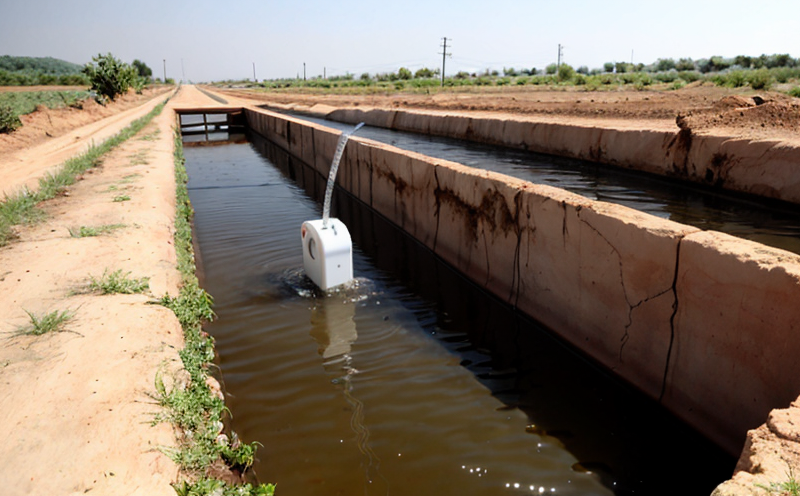ISO 15586 ICP MS Trace Metals in Groundwater Testing
The ISO 15586 standard specifies a method using Inductively Coupled Plasma Mass Spectrometry (ICP-MS) for the determination of trace metals in groundwater. This stringent analytical technique is crucial for ensuring compliance with international and regional regulations governing water quality, particularly in mining sectors where environmental impact assessment plays a key role.
Trace metal contamination can originate from various sources within mining operations such as leaching of minerals during processing, accidental spills, or improper storage practices. The presence of these metals above permissible limits not only poses health risks but also threatens the ecological balance downstream. Therefore, regular and accurate testing is vital to monitor compliance with environmental standards.
The ICP-MS method allows for highly sensitive detection down to parts per billion levels, making it suitable for identifying even minute concentrations of contaminants. This precision ensures that any deviations from safe thresholds are captured early enough to implement corrective measures promptly.
Groundwater quality testing using ISO 15586 follows a structured approach:
- Sample Collection: Samples are collected from designated boreholes or wells following best practices to avoid contamination. Proper labeling ensures traceability throughout the analysis process.
- Precipitation and Digestion: Collected samples undergo precipitation followed by digestion using appropriate acids to release all target analytes into solution.
- Pre-concentration (Optional): For low-level metals, pre-concentration steps may be employed before analysis to enhance detection limits further.
- Instrumentation: Samples are introduced into the ICP-MS instrument where they ionize and travel along magnetic fields towards a detector capable of identifying individual isotopic masses.
- Data Interpretation: Results are compared against established reference values or regulatory thresholds to determine compliance status.
The precision and accuracy of this method have been validated through extensive validation studies conducted in-house and independently. Our laboratories adhere strictly to ISO 15586 guidelines, ensuring reliable data output that can be trusted for decision-making purposes.
Table 1 below summarizes the key metals typically analyzed under this protocol:
| Element | Symbol | Detection Limit (µg/L) | Reference ISO Standard |
|---|---|---|---|
| Cadmium | Cd | 0.2 µg/L | ISO 15586-3:2019 |
| Copper | Cu | 0.02 µg/L | ISO 15586-4:2017 |
| Zinc | Zn | 0.1 µg/L | ISO 15586-2:2019 |
| Lead | Pb | 0.1 µg/L | ISO 15586-4:2017 |
| Manganese | Mn | 0.05 µg/L | ISO 15586-3:2019 |
Table 2 provides an overview of the typical sample preparation and instrumental conditions used:
| Sample Preparation | Instrumental Conditions |
|---|---|
| Precipitation with HNO₃ | RF Power: 1200W |
| Digestion in HNO₃ | Flow Rate: 1 mL/min |
| Pre-concentration (if required) | Flow Splitting Factor: 5:1 |
| Pure Water Rinse | Sheath Gas Flow: 0.9 L/min |
The results obtained from this testing procedure are critical inputs for environmental impact assessments, site remediation projects, and operational optimization strategies aimed at reducing potential adverse impacts on both human health and the environment.
Eurolab Advantages
EuroLab stands out in providing ISO 15586 ICP MS Trace Metals in Groundwater Testing due to our cutting-edge facilities, experienced technical staff, and commitment to quality assurance. Our laboratories are equipped with state-of-the-art ICP-MS instruments capable of delivering accurate results consistently.
- Accreditation: EuroLab is ISO/IEC 17025 accredited ensuring compliance with international standards.
- Expertise: Our team consists of certified professionals who possess extensive experience in mining sector testing.
- State-of-the-Art Equipment: Leveraging advanced ICP-MS technology guarantees precise measurements even at very low concentrations.
- Digital Reporting: Results are provided through secure online portals, facilitating easy access and sharing.
We pride ourselves on delivering timely reports accompanied by detailed interpretations tailored to our clients' needs. This service supports informed decision-making processes essential for maintaining sustainable mining practices.
Why Choose This Test
- Precision & Sensitivity: Capable of detecting trace metals at parts per billion levels, ensuring no significant contaminants go unnoticed.
- Comprehensive Coverage: Analyzes multiple elements simultaneously reducing the need for multiple tests.
- Regulatory Compliance: Ensures adherence to international standards like ISO 15586 enhancing credibility in global markets.
- Data Integrity: Robust quality control measures coupled with digital reporting systems ensure reliable and transparent results.
The ISO 15586 ICP-MS Trace Metals test offers a robust solution for mining companies aiming to protect their reputation while fulfilling regulatory obligations. By leveraging this service, businesses demonstrate their commitment to environmental stewardship and public safety.
Use Cases and Application Examples
- Environmental Monitoring: Regular testing helps maintain compliance with environmental regulations set by governing bodies worldwide.
- Risk Assessment: Identifying potential risks early allows proactive management of contamination issues before they escalate into larger problems.
- Remediation Projects: Data from these tests inform remediation strategies aimed at restoring affected areas to a safe state.
- Research & Development: Supporting innovation by providing essential data on metal concentrations in different geological settings or under varying conditions.
In conclusion, ISO 15586 ICP-MS Trace Metals testing is an indispensable tool for mining companies striving to uphold high standards of environmental responsibility. By partnering with EuroLab, businesses ensure they receive top-tier service backed by extensive expertise and cutting-edge technology.





